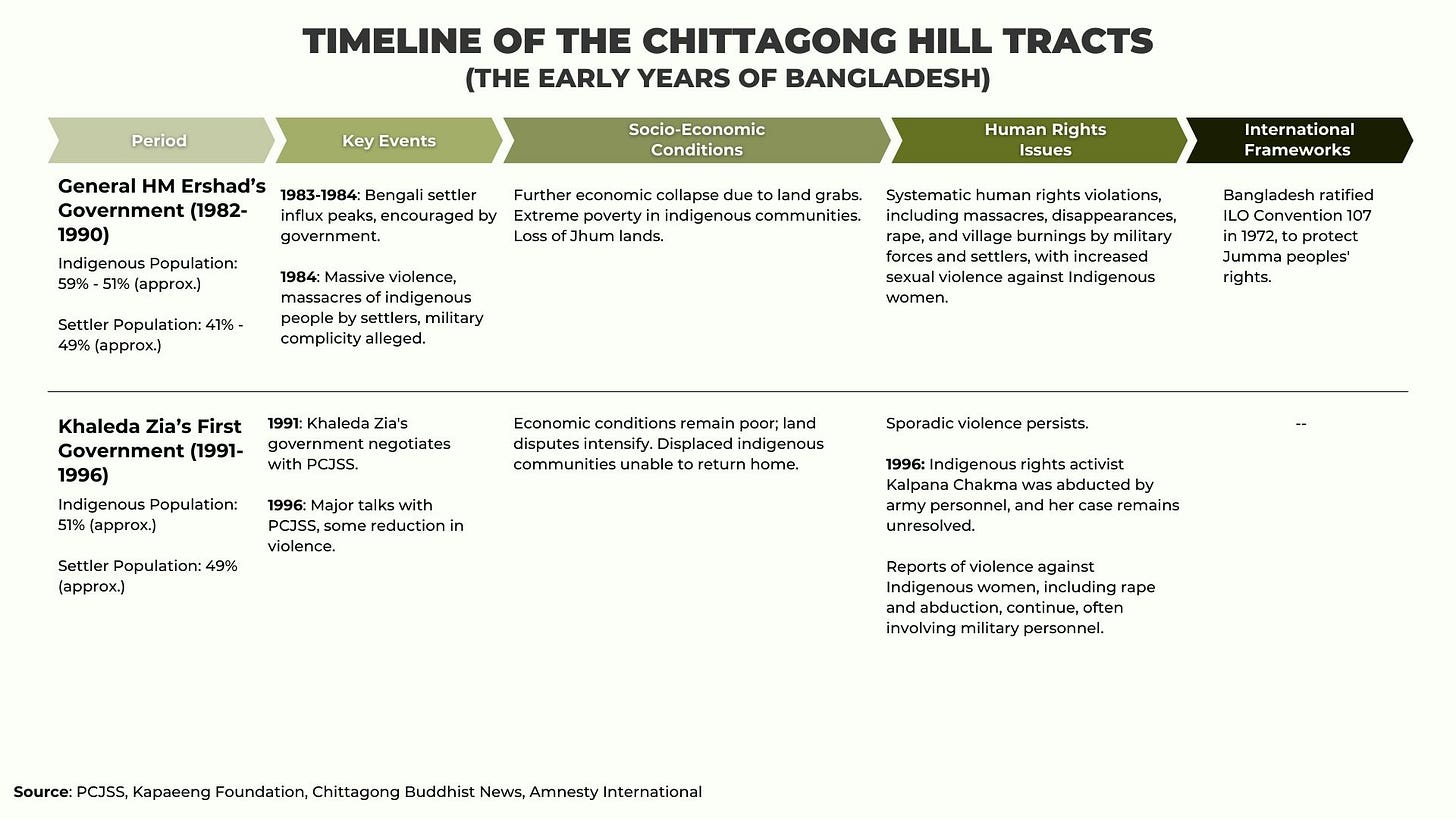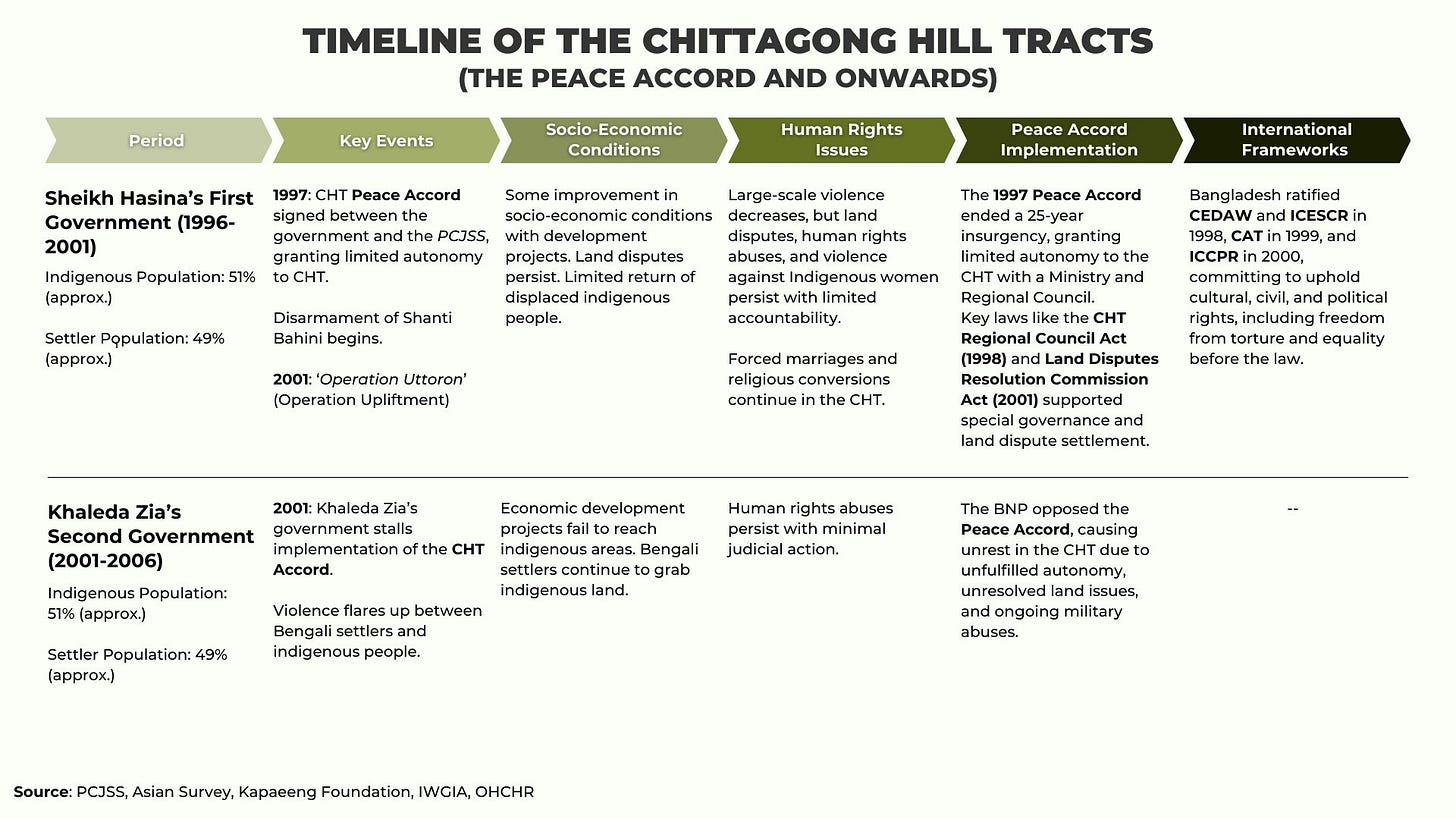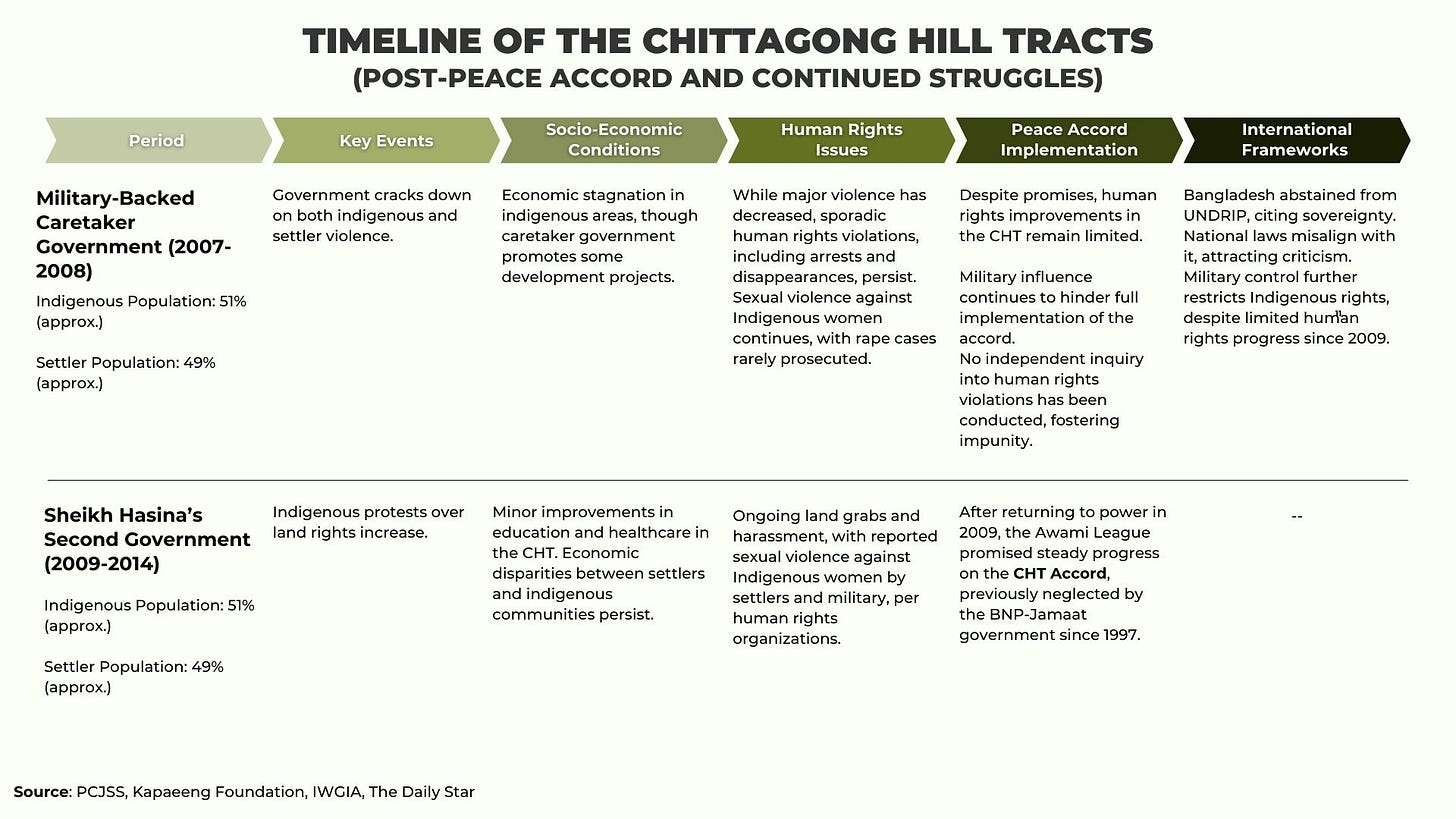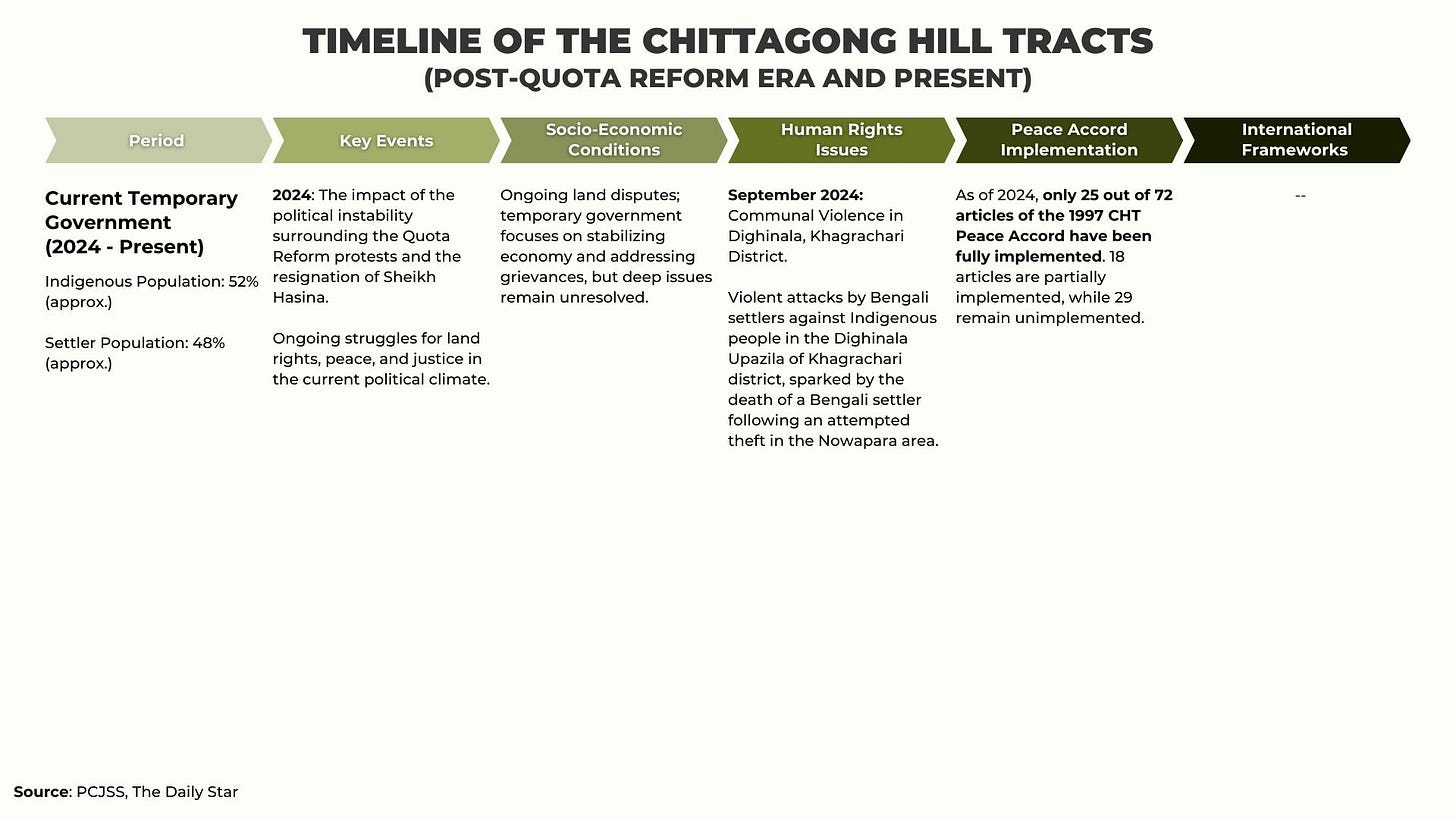From Displacement to Dignity: Upholding Indigenous Autonomy Through the Full-Scale Implementation of the CHT Peace Accord
BacharLorai spotlights the injustices committed against Bangladesh's Indigenous Peoples from 1860 to 2024, veiled under the banner of nationalism. A policy-focused rewrite of that script is a must.
For the fourth edition of ImpactInk, BacharLorai's Areeba Asif, Azkka Noor, and Apanuba Puhama interviewed Mangal Kumar Chakma, Information and Publicity Secretary of the Parbatya Chattagram Jana Samhati Samiti (PCJSS), and Pavel Partha, Director of Education, Culture, and Diversity at the Bangladesh Resource Centre for Indigenous Knowledge (BARCIK), for a progress update — or lack thereof — on the implementation of the Chittagong Hill Tracts (CHT) Peace Accord.
The research findings, gap analysis, and policy recommendations in this article have been framed to ensure they align strategically with the United Nations Sustainable Development Goal 16 on Peace, Justice, and Strong Institutions, as well as the United Nations Declaration on the Rights of Indigenous Peoples (UNDRIP).
On September 19, 2024, long-standing conflicts in the Chittagong Hill Tracts (CHT) escalated, resulting in the deaths of four Jumma men and injuries to more than a hundred others. Targeted violence and communal attacks erupted against the Jumma people in the Khagrachari and Rangamati districts, one day after the death of Mohammad Mamun, a Bengali settler in the CHT. In retaliation, Bengali settlers organized acts of aggression, including looting, vandalism, and the burning of Indigenous properties and businesses.
These settler-instigated attacks on Jumma communities are part of a long history of volatility and unrest in the region, pointing to an unresolved public policy issue: the inadequate implementation of the CHT Peace Accord, both in principle and in practice.
Bengali settlers refer to individuals of Bengali ethnicity who have moved into this region, which is constitutionally recognized as part of Bangladesh but holds autonomous historical and cultural importance for the Indigenous communities living there. The CHT is viewed by Indigenous groups, such as the Jumma people, as their ancestral land, leading to tense relations with nearly all governments of independent Bangladesh over land rights and resource control.
Located in southeastern Bangladesh, the CHT is home to 11 Indigenous groups collectively known as the Jumma people. On December 2, 1997, the CHT Peace Accord was signed by Jyotirindra Bodhipriya Larma, leader of the Parbatya Chattagram Jana Samhati Samiti (PCJSS), and Abul Hasnat Abdullah, representing the government of Bangladesh. In principle, the Accord sought to end the armed conflict in the region between settlers and the Jumma people and aimed to restore their sovereignty, which has consistently been under threat since British intervention.
The Accord was designed to shift the narrative on the CHT from viewing it as a security threat to one of meaningful integration, recognizing Indigenous rights to land, self-determination, and governance within their communities.
Key Insights from CHT Subject-Matter Experts
In response to the ongoing erosion of Indigenous and communal rights in the CHT, BacharLorai staff interviewed two subject-matter experts on the region, M.K. Chakma and Pavel Partha, both vocal advocates for Indigenous rights. The goal was to gain insights into the gaps in the implementation of the CHT Peace Accord and the resulting impact on the Jumma people.
What factors, in your opinion, led to the signing of the CHT Peace Accord in 1997?
M.K. Chakma: The Bangladeshi government was forced to sign the CHT Accord in 1997 as a result of the popular democratic movement of the Jumma people, first led by the PCJSS and then through the vigorous armed movement since the mid-seventies. Even though the PCJSS was engaged in armed struggle, they were always open to a political and peaceful solution through dialogue. As a result, the historic CHT Peace Accord was signed after a total of 26 rounds of dialogue between the governments led by General Hussein Mohammad Ershad, Begum Khaleda Zia, and Sheikh Hasina, and the PCJSS over time.
Pavel Partha: In 1962, under Pakistani rule, the erstwhile military government built the Kaptai Dam and displaced more than 100,000 Indigenous people. Following this, in 1972, Manobendra Narayan Larma, the CHT representative in Bangladesh’s first National Parliament, strongly opposed the constitutional identity for all people in Bangladesh to be of Bengali nationality. In the early 1980s, the state began provisioning Bengali settlements in the CHT, which led to a demographic hegemony. The expansion of militarization, monoculture of alien trees, cutting of hills, land grabbing, environmental destruction, intervention of corporate tourism, and the dominant discourses by the mainstream Bengali people are the underlying causes of the illness and sadness of the hills. The Peace Accord holds significant historical importance as it marks the commencement of a subsequent era focused on fostering peace and cooperation within the CHT region.
During the 23rd Session of the United Nations Permanent Forum on Indigenous Issues in April 2024, Moshiur Rahman, Secretary of the Ministry of CHT, claimed that 65 out of the 72 provisions of the Peace Accord had been implemented. In reality, however, how much progress has been made in implementing the CHT Peace Accord to safeguard Indigenous rights in Bangladesh?
M.K Chakma: PCJSS has performed all its obligations as conferred in the Accord. All members of PCJSS surrendered their arms and ammunition in four phases in 1998, and the military wing of PCJSS, Shanti Bahini, was abolished. On the other hand, the Awami League government did not implement two-thirds of the Accord, such as taking legal and administrative actions to preserve the tribal-inhabited nature of the CHT region, including transferring authority to the CHT Regional Council and Hill District Councils, resolving land disputes and returning dispossessed lands to the Jumma people through the CHT Land Dispute Resolution Commission, withdrawing military camps, ensuring proper rehabilitation of refugees, prioritizing local Jumma residents in jobs, and amending laws to align with the CHT Accord.
Instead, the government adopted a policy of solving the problem through massive militarization and repression. However, it is worth mentioning that the CHT Regional Council, the three Hill District Councils, and the CHT Affairs Ministry have been set up to introduce a special governance system in the CHT region. In addition, 65,000 Jumma refugees returned from India, 9,000 families remain without their land, and 40 villages are still occupied by Bengali settlers.
Pavel Partha: There have been no major changes in the daily life of Indigenous Peoples after the signing of the CHT Accord because it is not functioning properly. Day by day, they lose their land, culture, language, and traditional knowledge rights due to development projects, invasive tree plantations, commercial tourism, resorts, eco-parks, disregard for customary rights, multinational excavations, and military surveillance that continue to harm Indigenous communities. The state rarely prosecutes cases of murder, rape, persecution, and land grabs against Indigenous Peoples. Moreover, there is a hegemonic imposition of Bengali nationalism that prevents Indigenous People from using their own names.
Current and historic evidence suggests persistent displacement and land dispossession, militarization and human rights violations, and continuous violence against Jumma women and girls in the CHT. Could you briefly explain how the CHT Accord has been implemented to address these three specific areas?
Land Rights and Displacement:
M.K. Chakma: Land grabbing, displacement, and illegal infiltration are the most crucial issues of the CHT problem. As the CHT land disputes remain unresolved, land grabbing and the eviction of Jumma people by state and non-state actors continue, leading to communal attacks, arson, and harassment. For example, on April 26, 2022, 350 acres of Jhum-cultivation lands in Lama Upazila were set on fire by goons from Lama Rubber Industries, displacing 39 families and causing livelihood, food, and water crises, despite national protests.
Pavel Partha: Indigenous Peoples are functionally landless. The state does not recognize their territorial rights and customary land management. It creates lots of land debate, violence, and bloodshed. The CHT Land Dispute Resolution Commission was established in 1999 after the Accord, and the government enacted the CHT Land Dispute Resolution Commission Act in 2001. However, it does not entirely address the multilayered land conflicts and cannot ensure land justice for Indigenous Peoples.
Militarization and Human Rights Abuses:
M.K. Chakma: Though the CHT Accord contains a provision for the withdrawal of all temporary camps, the government has withdrawn only 101 of the 545 camps in three phases. Meanwhile, many army camps have been re-established. The Awami League government further promulgated a de facto military rule titled Operation Uttoron, also called Operation Upliftment, in 2001. Security forces have exercised absolute control over all sectors, including general administration, law and order, judiciary, and development, which has become one of the obstructions to democratic governance and the implementation of the special administrative system incorporating the CHT Regional Council and the three Hill District Councils.
Furthermore, during the post-Accord period, 21 communal attacks, including the recent Khagrachari-Dighinala-Rangamati incident that took place between September 18 and 20, 2024, were carried out by Bengali settlers under the sponsorship of a vested quarter of the state machinery and the ruling class. To that end, the Bengali settlers have been reorganized under a communal organization named Parbatya Chattagram Nagorik Parishad, which is carrying out anti-Accord activities, illegal land occupation, infiltration, and enlistment of outsiders.
Pavel Partha: The question of the militarization of the conflict between Bengali and Indigenous Peoples is part of a dominant discourse. It only increases the gaps between people and legalizes the authoritarian system and neoliberal discrimination. We need to change the dominant narrative and listen to and learn from the voiceless marginalized peoples. Land grabbing, dictatorship, dominant surveillance, and ecological destruction are also interconnected with the unresolved question of militarization. There are significant commitments regarding militarization in the Peace Accord, but the status has not addressed it willingly.
Violence against Indigenous Women:
M.K. Chakma: The most vulnerable victims of violence in the CHT are Indigenous Jumma women and girls. For example, recently, the army ordered the Indigenous people of Gachgagan Para and Thum Para on the Bilaichari-Jurachari border to leave the village and move elsewhere. As a result, the women and children of 23 families from the said village are in a state of insecurity. On March 14, 2024, six Indigenous Mro women and girls were brutally beaten by a young Muslim settler in Alikadam under Bandarban district. When they went to file a case with the Alikadam police station, the police officer in charge expressed his inability to take the case. According to General Recommendation Number 39, the government has declared that it will protect Indigenous women's rights and implement a policy of zero tolerance against violence against women, but Jumma women and girls have not received justice.
Pavel Partha: Women and girls are still fighting for gender justice. They continue to be victimized by male-dominant narratives and the oppression of systemic violence. For example, activist Kalpana Chakma was abducted in 1996, and to this day, there is no trace of her, nor has her family received any form of justice from the state.
Injustice Through the Years: 1860 to 2024
To illustrate the ongoing, multi-layered, and systemic inequities faced by the Jumma people, BacharLorai staff developed the following timeline infographic covering the period from 1860 to 2024. This infographic presents the socio-economic conditions and human rights violations before and after the Accord. It also outlines the treaties and conventions ratified by Bangladesh but inadequately upheld concerning Indigenous, cultural, and communal rights in the CHT.
Key Takeaways
BacharLorai’s independent research findings, in tandem with consultations with subject-matter experts, zoom in on five key takeaways:
Takeaway One: While the recently ousted authoritarian government claimed that two-thirds of the Accord had been implemented, key provisions such as the resolution of land disputes, the withdrawal of military forces, and the recognition of self-determination remain unaddressed. This has led to continued land dispossession, displacement, militarization, and violence, particularly affecting women and girls.
Takeaway Two: The lack of implementation of the CHT Accord has enabled continued land grabbing, displacement, and illegal occupation of the CHT by both state and non-state actors. The Jumma people are losing access to their ancestral lands, threatening their livelihoods and security.
Takeaway Three: Military presence in the CHT remains substantial, despite state promises to withdraw troops. The continuation of Operation Uttoron, notwithstanding the Accord’s commitment to end targeting of Indigenous Peoples, continues to disrupt the governance structures established by the CHT Peace Accord.
Takeaway Four: Jumma women and girls continue to face marginalization, with reports of violence, including rape and abduction, often going unaddressed. The absence of legal protection and judicial accountability has left Indigenous women without access to justice.
Takeaway Five: The timeline reflects a pattern of violence and rights violations against the Jumma people, including land displacement and socio-economic challenges, despite the existence of the Peace Accord and international frameworks. These conditions highlight the need for sustained attention to the structural issues that have persisted for more than a century.
Policy Recommendations
On August 5th, 2024, the Awami League government was deposed by a mass uprising, and a new interim government led by Dr. Muhammed Yunus was established. While the nation at large celebrated the removal of an authoritarian regime, mob mentality simultaneously took hold. Many leaders and supporters of the Awami League were attacked, and minorities in many cases were subjected to extrajudicial aggression and communal violence.
Local media reports indicate these attacks stem from political and personal motives, conspiracies by remnants of the previous regime seeking destabilization, and communal tensions, all against a backdrop of minorities historically facing mob violence simply for being minorities. Notwithstanding the political instability that often follows uprisings, some incidents have also been carried out by errant activists of the Bangladesh Nationalist Party, now in the driving seat after Hasina's fall. Regardless of who is responsible or their motives, minorities, including Indigenous Peoples, have long been used as political tools, and it must stop.
At present, the CHT hosts over 400 army, paramilitary, and police camps, along with six cantonments in the region. Recent communal attacks and incidents of arson in Khagrachari and Rangamati serve as reminders that the hills remain plagued by anti-Accord activities and discrimination against the Jumma people.
Looking ahead, the interim and future governments of Bangladesh have an opportunity to address the systemic discrimination of the Jumma people by fulfilling the provisions outlined in the CHT Peace Accord.
The following six policy recommendations, informed by the insights of M.K. Chakma and Pavel Partha and supported by an independent gap analysis based on secondary research by BacharLorai staff, are proposed for consideration:
Recommendation One: Develop and implement a comprehensive action plan via a clearly defined roadmap to address the outstanding provisions of the CHT Accord. This should include the immediate enactment of the Rules for the CHT Land Dispute Resolution Commission, as recommended by the CHT Regional Council, and the systematic withdrawal of all temporary military installations, including those operated by the Army, Ansar, APBN, and VDP, effectively dismantling the ongoing de facto military governance in the CHT.
Recommendation Two: Fully devolve administrative authority over key areas, including general administration, law enforcement, land management, forest and environmental regulation, and communication infrastructure development, to the CHT Regional Council and the three Hill District Councils, as stipulated by the CHT Accord. Local elections should be conducted to ensure accountable governance within these institutions.
Recommendation Three: Expedite the formal adoption and implementation of the United Nations Declaration on the Rights of Indigenous Peoples, endorsed by the United Nations General Assembly in 2007, into domestic policy frameworks.
Recommendation Four: Establish an independent Indigenous Commission, with technical support from the United Nations, to investigate and deliver justice in cases of violence, murder, disappearance, rape, arson, and targeted attacks, with a specific focus on violence against Jumma women in the CHT.
Recommendation Five: Ensure the dignified relocation and rehabilitation of Bengali settlers outside the CHT to alleviate land conflicts and promote social cohesion.
Recommendation Six: Consult with Indigenous communities to pursue quota reform for Indigenous Peoples in public sector recruitment to enhance representation. The specific percentage should be collaboratively determined between the government and Indigenous advocates, considering the sensitivity of quotas in light of recent anti-quota movements.
Mangal Kumar Chakma is an Indigenous Peoples’ rights activist. He has been dedicatedly working for the promotion and protection of the human rights of Indigenous Peoples in Bangladesh for a long time. He has been serving as the Secretary for Information and Publicity of PCJSS, a political organization of Indigenous Jumma Peoples in the CHT. He is also an advisor to Kapaeeng Foundation, a national human rights organization for Indigenous Peoples in Bangladesh. He has written several articles on CHT and Indigenous issues that have been published in national and local newspapers and magazines and has edited several books and magazines. He has also participated in several seminars, workshops, and conferences at both international and national levels, including the United Nations Permanent Forum on Indigenous Issues (UNPFII), UN Working Group on Indigenous Populations (WGIP), and UN Working Group on the Draft Declaration (WGDD) as a participant and resource person.
Pavel Partha is the Director of Education, Culture, and Diversity at the Bangladesh Resource Centre for Indigenous Knowledge (BARCIK). He relies on the resilience and resistance of subaltern people and values learning from the critical relationships among all life forms. His commitment to ecological justice encompasses the struggles of Indigenous Peoples, biological diversity, disaster risk management, eco-feminism, and the politics of representation. Pavel completed his M.Sc. degree in Botany from Jahangirnagar University and conducted pioneering ethnobotanical research with Indigenous Peoples in Bangladesh. He actively protests against eco-parks and safari parks that threaten Indigenous livelihoods. Pavel's critiques focus on colonial and neo-liberal control over natural and cultural diversity. He is the author of several significant works including Bondi Selai O Sangram in 2014, Khaddo Longhon O Lorai in 2010, Aronner Lorai in 2010, Uttarbanger Adibashi Muktijoddha in 2009, and Madhupurer Pranboichitro in 2004. His writings span research articles, investigative reports, popular narratives, short stories, columns, and poetry on diversity, interdependence, and pluralism.
Impact Opportunities
Job Drop: Gain invaluable experience as an intern at the United Nations, contributing to global development, human rights, and peacebuilding initiatives. This opportunity is specifically designed for high school and undergraduate students, providing a platform to engage with various programs, including the UN Traineeship, Undergraduate Development Programme, and Summer Internships. Participants will have the chance to work in fields such as marketing, legal studies, and international relations while gaining insight into the UN's vital role in addressing global challenges. Interns will engage in hands-on experiences, develop essential skills, and connect with professionals in the field. Interested candidates are encouraged to submit a cover letter detailing their interest, along with a current CV and any additional required documents. This internship offers a unique opportunity to expand networks and make a meaningful impact on global issues.
Scholar’s Hop: Engage with the Indo-Pacific Young Leaders Program, an initiative by the Asia Pacific Foundation of Canada aimed at deepening Canadian engagement in the region. This program offers early- and mid-career professionals aged 25-40 from jurisdictions such as Bangladesh, India, Indonesia, Japan, Malaysia, Mongolia, Philippines, Singapore, South Korea, Taiwan, and Thailand a unique opportunity to participate in a one-week familiarization visit to Canada. Participants will meet with government officials, industry leaders, and experts to discuss key issues like regional security, innovation, and sustainable development. The program also includes virtual monthly briefings and potential participation in APF Canada events in the Indo-Pacific. Interested candidates should submit a cover letter, CV, and a citizenship statement in a single PDF by October 10, 2024, to aro.program@asiapacific.ca.
Writer’s Shop: Participate in the Op-Ed Project’s writing workshops designed to empower you to make a difference in the world. The core workshop, Write to Change the World, uses time-tested models of transformational learning to help participants explore credibility, persuasion, and the difference between being right and being effective. Attendees emerge with op-ed drafts and gain access to a national network of journalist mentors for follow-up. The advanced workshop, Accelerating Ideas, is exclusively for alumni and focuses on connecting diverse knowledge sets to accelerate your ideas. Workshops are available from October 2024 to June 2025, welcoming individuals of all identities and backgrounds, with a commitment to prioritizing underrepresented groups. Refunds are available within 48 hours of purchase, with options to transfer or Pay It Forward after that period. Scholarships are provided for those in need, ensuring access for all.
About ImpactInk
ImpactInk, a dedicated platform under BacharLorai, curates and publishes essential discussions and insights from the non-profit, philanthropy, and social impact sectors. Designed to address the need for a cohesive discourse platform in these areas, ImpactInk aspires to serve as the go-to hub for policy insights and collaborative idea exchange.
For pitches or to learn more about ImpactInk, please reach out to the Editor-In-Chief and BacharLorai’s Director of Policy Research at aftab.ahmed@bacharlorai.com.













